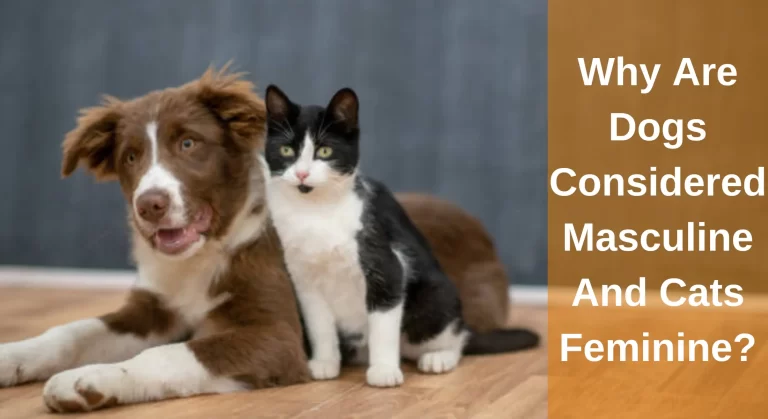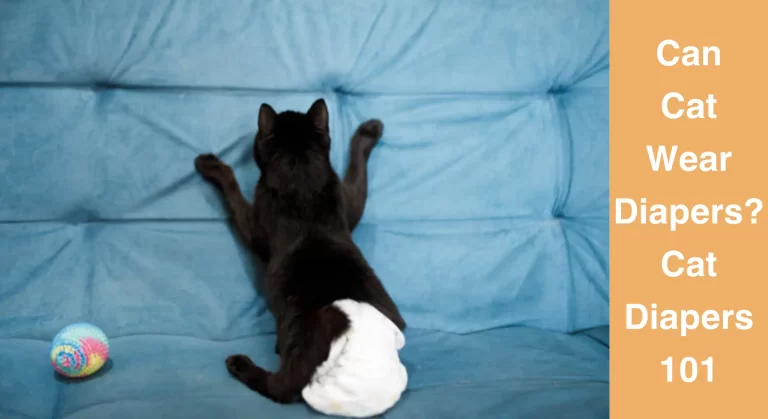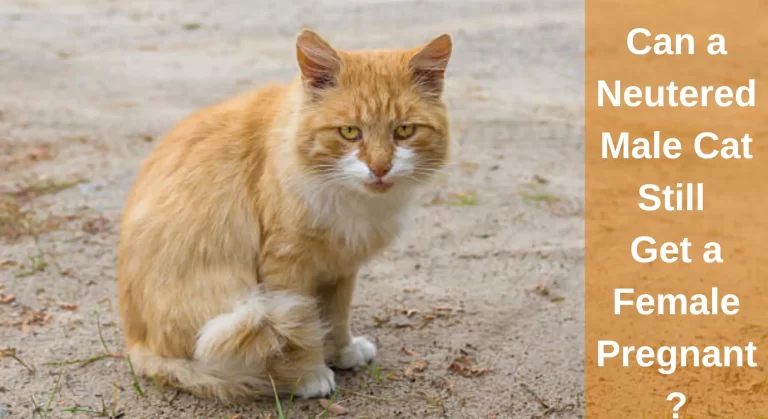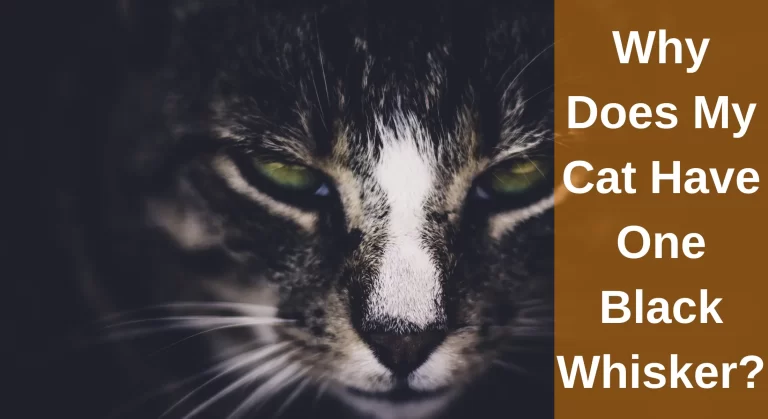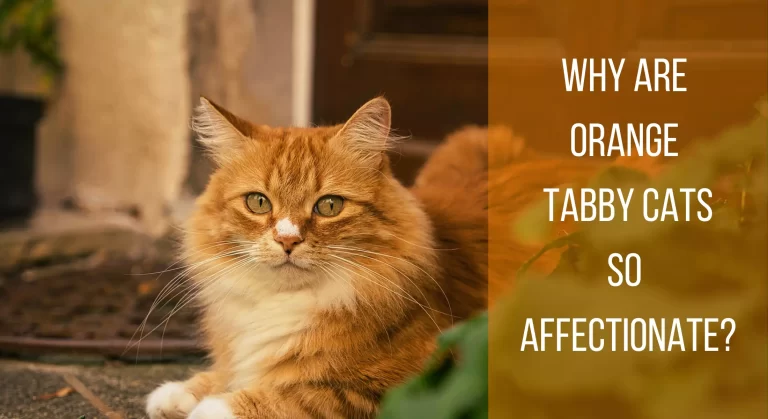Differences Between Devon Rex and Cornish Rex Cat: All You Need To Know
Choosing between the Devon Rex or Cornish Rex cat’s strains will be challenging for someone unfamiliar. They’re similar in terms of their physical features, places of birth, and, even more, their breed identities. Even though they may appear similar at first, you’ll get to know how different they are from one another after becoming familiar with them. So, a potential owner needs to conduct extensive research to choose which cat breed is ideal for their home and the differences between Devon rex and Cornish rex cats.
The primary difference between Devon Rex and Cornish Rex cats is their size and coat. Devon Rex cats are slightly larger, with a more muscular build and shorter legs. Their coat is soft and wavy, but it has guard hairs and sheds. Cornish Rex cats are slightly smaller, with a slender build and long legs. Their coat is also soft and wavy, but it lacks guard hairs altogether, so it does not shed.
Additionally, their origins vary, with Devon Rex originating in England and Cornish Rex in Cornwall. These breeds also differ in their personalities, with Devon Rex cats often being more affectionate and outgoing, while Cornish Rex cats are known for their independence and self-assured nature.
In today’s article, we’ve provided enough information regarding these 2 breeds that help you to distinguish between them. So, let’s dig into this article and find more interesting facts about these breeds:
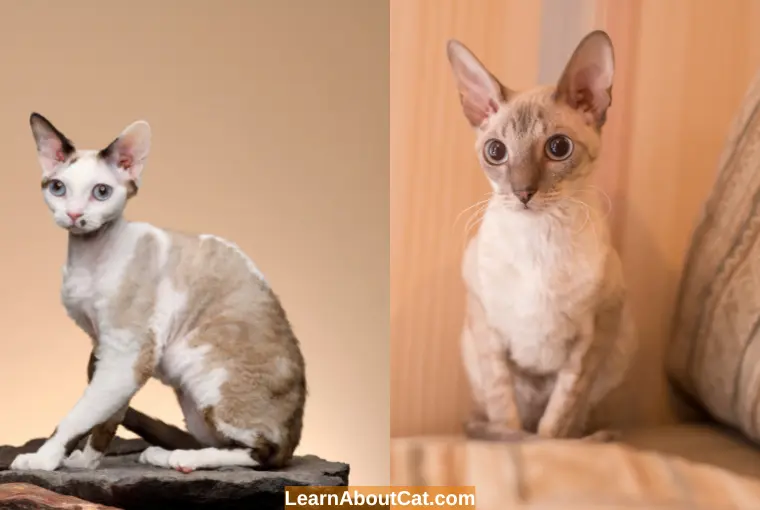
What Is a Rex Cat?
Rex cats are the result of a unique mutation that forms delicate, slender physique cat breeds known as the Cornish or Devon. Both these breeds are produced from a single ancestor, but unique mutations make their hair follicles oval-shaped instead of standard round form. Rex cat’s hair grows in curly form rather than normal cats whose hairs grow straight.
Rex breeds are renowned for great stamina, intelligence, and sturdy bodies. These cats learn tricks quickly and compete with other cats while playing games.
Cornish Rex vs Devon Rex (Differences Between Devon Rex and Cornish Rex )
Here we’ll examine both breeds in detail and determine precisely what distinguishes them. By comparing Cornish Rex vs Devon Rex (Breed Origins-Size Appearance, & Coloring-Temperament-Exercise Needs-Grooming Requirements-Health Problems-Cost Per Kitten), you’ll be able to select a perfect breed for yourself.
Both cat breeds are renowned for their lively personalities and luxurious fur. These cat breeds have curly fur, huge ears, and lean, robust bodies that may confuse you easily. Despite sharing similar traits, there is a clear distinction between these breeds.
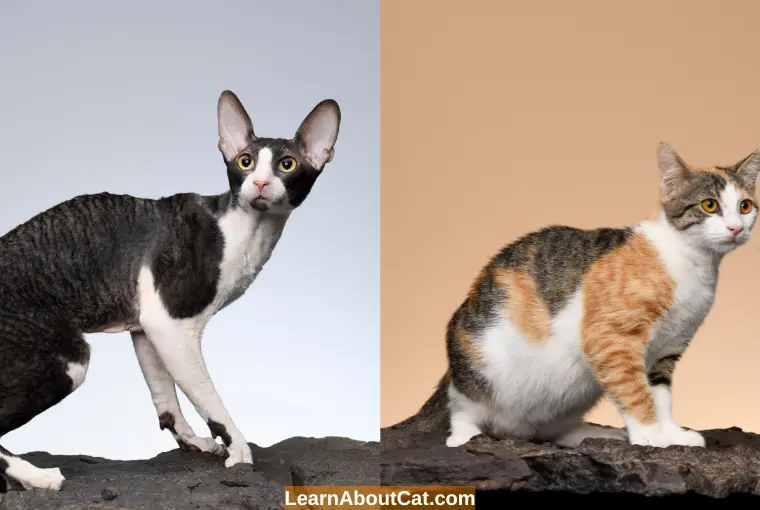
Breed Origin: Cornish Rex Overview
The Cornish Rex breed was a native of Cornwall and first appeared in the 1950s. It is produced because of a genetic abnormality that gave the litter’s kittens a peculiar fur texture. The kitten’s ancestors were an anonymous male cat and a British Shorthair female. Both of them are mated to create this breed.
When these Cornish breeds reached America, they were mated with American Shorthair and other species to prevent this breed from extinction as they were getting extinct in England.
Breed Origin: Devon Rex Overview
Devon Rex cat was first produced in 1960 in Devonshire city in England. When a breeder mated a Cornish cat with Karlee, which is an odd-looking breed, the waviness in the coat disappeared, and a new breed was produced. Karlee created a rare genetic abnormality, due to which Devon Rex, a modern breed, was created.
Size
Although Devon-breed cats are typically lighter than Cornish ones, they’re slightly bigger. The main difference between these outstanding cats is their size.
- Devon Rex breeds: have a weight limit of 9 pounds, typically one inch bigger than their continental equivalents. The shoulder size of Devon cats ranges from 25 to 30 cm.
- Cornish Rex breeds: have a maximum of 10 pounds weight. Cornish cats have 20 to 24-cm shoulder sizes.
Appearance
The physical appearance of Devon and Cornish breeds is one of the noticeable distinctions.
- Cornish breeds have bigger triangle ears, similar to bat ears. Moreover, they’ve oval-shaped heads and high cheekbones. They have taller necks, small, muscly back legs, and lean bodies.
- The Devon breed has large, spherical ears; located on the lower side of their heads. They feature smaller back legs and an extra masculine body, especially in the chest part.
Colouring
- If you choose the Devon breed, they come in a wide variety of natural colors, such as
- Light purple or lilac
- Black
- Blue tones
- Pure white
- Chocolate brown
- Cinnamon shade
- On the other hand, the Cornish breed offers all the above colors in their coat, including
- Brown,
- Red
- Cream
Temperament
- The Devon Rex cat includes many appealing traits that make it a perfect cat for families. These cats are social, loving, and talkative. They enjoy being with their favorite person and love to be purred by their owners for the whole day. They retain all their kitten-like characteristics as they grow up, making the most demanding.
- A Cornish Rex cat is a real adventurer; you’ll most likely find them in odd spots, including the refrigerator top or cabinets. This cat enjoys playing here and there, and whatever he observes can stimulate his interest. These cats have a friendly nature and get attached to new people. Once you become friends with him, he’ll always be by your side.
Exercise Needs
- You can easily motivate Devon Rex cats for some exercise. They like doing ordinary tasks like playing catch or tree climbing. The lively nature of these cats keeps them fit and active, as playing time is a wonderful moment to bond with these cats. So, you must bring toys for them, take them out daily, and let them go to wander and explore your lawn.
- Cornish Rex cats are small in size, but they can easily finish a large meal alone. Fortunately, his healthy lifestyle keeps him from getting extra weight. No need to provide them with activities for playing, as they have a natural tendency to find activities for themselves.
Grooming Requirements
- Devon Rex cats need more attention in the case of grooming than other species, but that doesn’t mean that they need high maintenance. You need to bathe him regularly for proper care of their greasy hair. Cut their nails whenever they grow bigger and use a smooth brush to clean their ears and lower their shedding rate; 2-3 days within a week.
- Cornish Rex cat’s grooming task isn’t difficult, as they’ve small and wavy coats that are easy to maintain. So, they only need a weekly brushing that will help to get rid of any errant and old hair. Also, it helps to preserve natural oil for healthy skin.
Health Problems
- Devon Rex: This breed carries some inherent hazards; thus, routine examinations are necessary to maintain their fitness. But the average lifespan of a Devon Rex is between 9 and 15 years. Some of the following ailments could harm this breed:
- Cornish Rex: Cornish Rex cats are muscular and healthy-looking, with few hereditary health issues. But, when they get old, they may get common diseases, including:
- Patellar Luxation
- Kidney disorder
- Hypertrophic cardiomyopathy
- Rhinotracheitis
Cost Per Kitten
- If you want to adopt a Devon Rex cat, then it’ll cost you $75 to $150. But as a reputable breeder, it’ll cost $1,200 to $1,800.
- On the other hand, a Cornish Rex cat adoption will cost you $75 to $150. While, as a reputable breeder, it’ll cost $800 to $1,300.
The 4 Key Differences Between Devon Rexes and Cornish Rexes
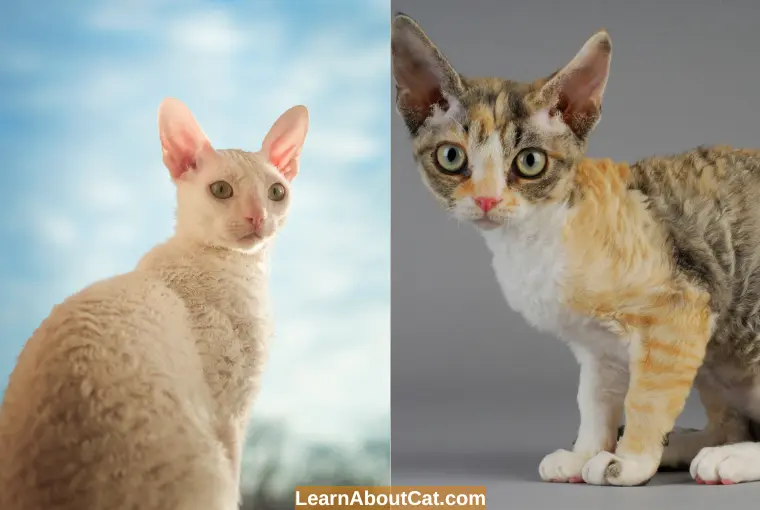
- Cornish cats are slightly heavier than the Devon ones, but in height, Devon Rexes win the game and are 3-4 inches taller than them.
- Both cat breeds have unique coats, but the Cornish cat has a much finer coat than Devon Rex. Devon Rexes have a wavy but short coat, while the Cornish Rexes have fine and curly coats with whiskers.
- The egg-shaped head, along with lifted cheekbones and large and triangle-shaped ears of Cornish cats, makes it different from Devon cats having wedge-shaped elf-like heads.
- However, both cats have good natures, and they proved to be excellent pets. But Cornish cats have a more agile and lively nature than Devon ones and are also easy to train.
Are Devon Rexes and Cornish Rexes Hypoallergenic?
No cats are genuinely 100% hypoallergenic; Both Rexes cat breeds are hypoallergenic. Because as we read above, they have short hairs, which they do not shed so much, so they’re unlikely to cause allergic reactions than other cat breeds.
An allergy reaction in cats is not a result of the length of the fur; it is due to a glycoprotein called Fel d1, which is produced by the sebaceous glands of the skin, saliva, dander, and urine.
Check Out: Are Ragdoll Cats Hypoallergenic? Debunking the Hypoallergenic Myth
Are Cornish Rex Cats Affectionate?
Despite their menacing appearance, Cornish Rexes has a kind nature. These cats are loving, smart social creatures who love to engage with people and other animals. Cornish cats like to play and maintain this excitement and enthusiasm throughout their lives.
Are Devon Rex Cats Affectionate?
Devon rex cats are also social and have a loving nature. But they get scared if you leave them alone. Still, they welcome the other furry friend at your home because of their friendly nature.
Are Cornish Rex cats friendly?
Yes, Cornish Rex cats are generally known for their friendly and affectionate nature. They tend to be sociable, enjoy human companionship, and often seek attention and interaction with their owners.
Are Cornish Rex like dogs?
Cornish Rex cats can exhibit some dog-like traits, such as their love for attention and companionship. They are known for following their owners around and participating in activities, making them more interactive than some other cat breeds. However, they are still fundamentally cats and have their unique feline behaviors and characteristics.
Do Devon Rex cats like dogs?
The compatibility of Devon Rex cats with dogs can vary from cat to cat. Generally, their sociable and friendly nature makes them more likely to get along with dogs, especially if they are introduced and socialized properly from a young age. However, individual cat and dog personalities also play a significant role in determining their compatibility. Proper introduction and supervision are essential when introducing a Devon Rex cat to a dog to ensure a harmonious relationship between them.
Are Devon Rex cats talkative?
Yes, Devon Rex cats are known for being more talkative and vocal compared to some other breeds. They often enjoy communicating with their owners through meows, purrs, and chirps, making them quite expressive and engaging.
Do Devon Rex cats eat a lot?
Devon Rex cats are relatively active cats, so they may need to eat more than some other cat breeds. However, it is important to feed your Devon Rex cat a high-quality diet and to monitor their weight to make sure they do not become overweight.
Do Devon Rex cats lose hair?
Devon Rex cats are often referred to as hypoallergenic due to their low shedding. While they do shed some hair, their short and curly coats minimize shedding, which can be a relief for people with cat allergies. However, it’s essential to note that no cat breed is entirely hypoallergenic, and individual reactions to cat allergens can vary.
Which Cat is Right for You?
Both species are wonderful pets as both are affectionate, adventurous, and spirited cats. They’re very similar, but the Cornish Rexes breed is more social, lasts longer, and also has fewer inherited health problems than Devon ones.
Still, both breeds are ideal if they provide them with a better lifestyle for maintaining their lifespan and health.
Frequently Asked Question
Are Devon Rexes and Cornish Rexes good with other pets?
Whether you keep these Rex cats with other cats, dogs, or even other animals, they behave much nicely with all of them as they’re friendly.
How do I know if my cat is a Devon Rex?
If you have a standard-size cat with a height of 25-30 cm and a weight of 6 to 9 pounds, then it’s a Devon cat. Moreover, this breed has distinguishing features, including enormous ears, wide eyes, lifted cheekbones, a taller neck, and a slim physique that makes it different from other cats.
How do you identify a Cornish Rex?
The Cornish Rex’s thin bones may make her appear nearly delicate and curvy. Moreover, this cat is sporty and not delicate. Their head is short and slim, with huge ears and pupils that appear larger than their head. All these features will help you identify Cornish cats.
Are Devon Rex and Cornish Rex good for families with children?
Both breeds are generally good with children, but Devon Rex cats are often more outgoing and sociable, making them a popular choice for families.
Can these cats be easily trained?
Devon Rex cats are more trainable and enjoy learning tricks. Cornish Rex cats are intelligent but may be more independent in their behavior.
What is the smallest cat breed?
The Singapura is often considered one of the smallest cat breeds in terms of size. It’s a petite breed with a delicate frame and a slender body. While not all individuals of this breed are exceptionally small, they are generally smaller than many other cat breeds.
Conclusion
Both these Rexes breeds are much more alike than dissimilar, and either cat will make a loving, social, amusing, and devoted family member. Their small, curly coats, wrinkled beards, and big floppy ears give them a distinctively elegant look. Both breeds need little grooming and are simple to care for.
Whereas the Devon Rex’s cats are gentler and more laid-back than the Cornish ones. Still, both breeds make excellent choices if you’re searching for a fun, active cat who is friendly, caring, and faithful.
Who is Isabella?
My name is Isabella, and I am a dedicated and knowledgeable cat enthusiast. With years of experience caring for cats and a deep love for felines, I made a mission to help other cat lovers navigate the challenges of cat ownership.


